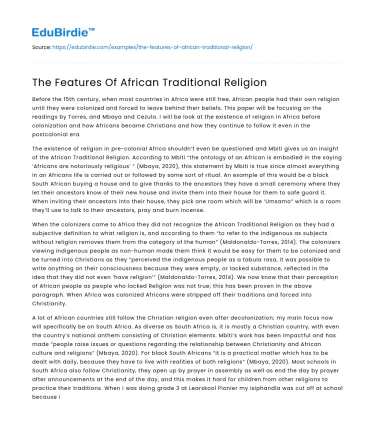Before the 15th century, when most countries in Africa were still free, African people had their own religion until they were colonized and forced to leave behind their beliefs. This paper will be focusing on the readings by Torres, and Mbaya and Cezula. I will be look at the existence of religion in Africa before colonization and how Africans became Christians and how they continue to follow it even in the postcolonial era.
The existence of religion in pre-colonial Africa shouldn’t even be questioned and Mbiti gives us an insight of the African Traditional Religion. According to Mbiti “the ontology of an African is embodied in the saying ‘Africans are notoriously religious’ ” (Mbaya, 2020), this statement by Mbiti is true since almost everything in an Africans life is carried out or followed by some sort of ritual. An example of this would be a black South African buying a house and to give thanks to the ancestors they have a small ceremony where they let their ancestors know of their new house and invite them into their house for them to safe guard it. When inviting their ancestors into their house, they pick one room which will be ‘Umsamo” which is a room they’ll use to talk to their ancestors, pray and burn incense.
Save your time!
We can take care of your essay
- Proper editing and formatting
- Free revision, title page, and bibliography
- Flexible prices and money-back guarantee
When the colonizers came to Africa they did not recognize the African Traditional Religion as they had a subjective definition to what religion is, and according to them “to refer to the indigenous as subjects without religion removes them from the category of the human” (Maldonaldo-Torres, 2014). The colonizers viewing indigenous people as non-human made them think it would be easy for them to be colonized and be turned into Christians as they “perceived the indigenous people as a tabula rasa, it was possible to write anything on their consciousness because they were empty, or lacked substance, reflected in the idea that they did not even ‘have religion’” (Maldonaldo-Torres, 2014). We now know that their perception of African people as people who lacked Religion was not true; this has been proven in the above paragraph. When Africa was colonized Africans were stripped off their traditions and forced into Christianity.
A lot of African countries still follow the Christian religion even after decolonization; my main focus now will specifically be on South Africa. As diverse as South Africa is, it is mostly a Christian country, with even the country’s national anthem consisting of Christian elements. Mbiti’s work has been impactful and has made “people raise issues or questions regarding the relationship between Christianity and African culture and religions” (Mbaya, 2020). For black South Africans “it is a practical matter which has to be dealt with daily, because they have to live with realities of both religions” (Mbaya, 2020). Most schools in South Africa also follow Christianity, they open up by prayer in assembly as well as end the day by prayer after announcements at the end of the day, and this makes it hard for children from other religions to practice their traditions. When I was doing grade 3 at Learskool Pionier my isiphandla was cut off at school because it was against the code of conduct. This just goes to show that a lot of South Africans “regard African religion as demonic and try to keep it out of the church and Christian life” (Mbaya, 2020).
Mbiti has given us insight on the existence of African Traditional Religion before colonization, and we have seen how Africans had to leave behind their beliefs for Christianity. African countries still follow Christianity even after decolonization; South Africa is an example of this. And a religion that is authentic to Africans is still frowned upon till this day by other religions, more especially Christians.






 Stuck on your essay?
Stuck on your essay?

